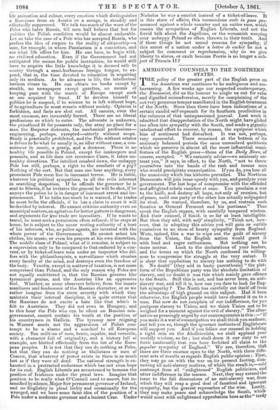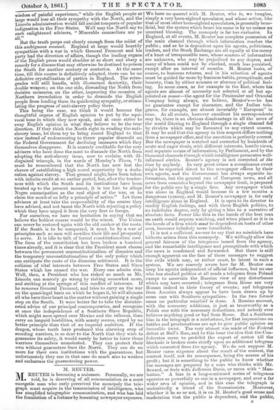AMBIGUOUS COUNSELS TO THE NORTHERN STATES.
T'policy of the greater part of the English press on the American war continues to be ambiguous and em- barrassing. A few weeks ago our respected contemporary, the Economist, did us the honour to single us out for calm and dignified animadversion, merely for complaining of the not,very generous temper manifested in the English treatment of the North. Since then there have been indications of a certain candid self-reproach for its Southern proclivities in the columns of that unimpassioned journal. Last week it admitted that disapprobation of the North might have glided too often into sympathy with the South, and made a gigantic intellectual effort to recover, by reason, the equipoise which bias of sentiment had disturbed. It was not, perhaps, very successful. There remained at the bottom of its anxiously balanced periods the same unresolved antithesis which we perceive in almost all the more influential mani- festoes of the English press—those of the Daily News, of course, excepted. " We earnestly advise—we anxiously en- treat you," it says, in effect, to the North, "not to throw yourselves into the bands of the rash and insane men who would precipitate emancipation. If you do, you lose all the unanimity which has hitherto prevailed. The Northern Democrats will join issue openly with you, and paralyze your government. The last hope of compromise with the offended and affrighted rebels vanishes at once. You proclaim a war to the knife, and destroy all hope, not only of reunion, but of peace, until one party or the other has actually subjugated its rival. Be warned, therefore, by us, and restrain such fanatics as General Fremont and his partisans." Thus speak the English organs, with carefully tempered wisdom. And their counsel, if timid, is so far at least intelligible. But then they add, with nail' simplicity, "Think not, how- ever, that in adopting this advice pod will gain or entitle yourselves to an atom of hearty sympathy from England. Were, indeed, this a war to wipe out the guilt of slavery from the Union, the English nation would greet it with loud and eager enthusiasm. But nothing can be more untrue. Look to the declarations of your leaders, and the terms on which the North confessed its willing- ness to compromise the struggle at the very outset. It is clear that oppbsition to slavery has nothing to do with it. No doubt" (they add in hasty parenthesis) " the plat- form of the Republican party was the absolute limitation of slavery, and no doubt it was this which mainly gave offence to the South. Still this is not, and has never been, an anti- slavery war, and till it is, how can you dare to look for Eng- lish sympathy ? The North has carefully cut itself off from the advantage of high ground on this subject. Had it been otherwise, the English people would have cheered it on to a man. But now do not complain of our• indifference, for you postpone slavery to Union, and we think Union not to be weighed for a moment against the evil of slavery." The alter- native so pressingly urged by our contemporaries is this : —"If you make it a war of emancipation we shall think you madmen, and tell you so, though the ignorant instincts of Englishmen will support you. And if you follow our counsel in holding a tight rein on the Abolitionists, we shall applaud your worldly wisdom, so far ; but shall deem it our duty to set forth continually that you have forfeited all claim to the popular sympathy of England." We see, therefore, that there are three courses open to the North, with three diffe- rent sets of results as regards English public opinion : First, they may go on with the war on its present footing, disa- vowing all anti-slavery motives, of which the result is,—cold contempt from all "enlightened" English politicians, and utter indifference in the masses. Next, they may extend the issue to the full dimensions of an anti-slavery -war, from which they will reap a good deal of fanatical and ignorant sympathy, but the gravest reproaches of the wise. Lastly, they may make peace and acknowledge the South, which would meet with enlightened approbation here as the" tardy wisdom of painful experience," while the English people at large would lose all their sympathy with the North, and the Lincoln administration would fall amidst tempests of popular indignation in the Free States. Well may the North say to such enlightened advisers, " Miserable counsellors are ye all .a But the truth peeps out clearly enough from the midst of this ambiguous counsel. England at large would heartily sympathize with a war in which General Fremont and his party had the direction of affairs, though the leading organs of the English press would shudder at so short and sharp a remedy for a disease that may otherwise be destined to poison the South for another century or centuries. At the same time, till this course is definitively adopted, there can be no definitive crystallization of parties in England. The retro- grades will still handle, with ill-omened dexterity, their double weapon ; on the one side, dissuading the North from decisive measures, on the other, improving the occasion of Northern irresolution in order to dissuade the English people from lending them its quickening sympathy, or stimu- lating the progress of anti-slavery policy there. This being the case, we think it would become the thoughtful organs of English opinion to put by the equi- vocal tone in which they now speak, and at once strive to sway English opinion in what they believe to be the true direction. If they think the North right in evading the anti- slavery issue, let them try to bring round England to that view instead of endeavouring to throw popular discredit on the Federal Government for declining measures which they themselves disapprove. It is scarcely creditable for the very advisers who have done the most to dissuade the North from adopting the anti-slavery issue, now to exclaim with ill- disguised triumph, in the words of Monday's Times, "It must be remembered that the North has now lost the chance of establishing a high moral superiority by a decla- ration against slavery. That ground might. have been taken with infinite credit at an earlier period, but, after the tender- ness with which the South and its institutions have been treated up to the present moment, it is too late to allege Negro emancipation as the real object of the war, or to claim the merit of so lofty a principle of action." Let these advisers at least take the responsibility of the, course they have advised, and not taunt the North with rejecting a policy which they have urged it from the very first to forego. For ourselves, we have no hesitation in saying that we believe the boldest course would be the wisest. The Union can never be restored again with the old canker at the roots. If the South is to be conquered, it must be by a war of principles such as men will sacrifice their life and prosperity to serve. It is idle to talk of formal constitutionalism now. The form of the constitution has been broken a hundred times already, and it is clear that the President must choose between the permanent unconstitutionalism of disunion and the temporary unconstitutionalism of the only policy which can extirpate the roots of the disunion sentiment. It is the collision of vital interests between Free States and Slave States which has caused the war. Every one admits this. Well, then, a President who has risked so much as Mr. Lincoln can scarcely go wrong by risking somewhat more, and striking at the springs of this conflict of interests. If he removes General Fremont, and tries to carry on the war on the quasi-legal basis on which he began it, he will alienate all who have their heart in the matter without gaining a single step on the South. It were better far to take the disinter- ested advice of our principal contemporaries, and recognize at once the independence of a Southern Slave Republic, which might soon spread over Mexico and the isthmus, than carry on languid hostilities, with scanty means, urged by no better principle than that of an imperial ambition. If the dragon, whose teeth have produced this alarming crop of seceding warriors, is so dear to the North that they wish to guarantee its safety, it would surely be better to leave those warriors themselves unmolested. They can protect their own without guarantees from the North. They can do no more for their own institutions with the guarantees, but unfortunately they can in that case do much also to weaken and embarrass the guaranteeing power.































 Previous page
Previous page